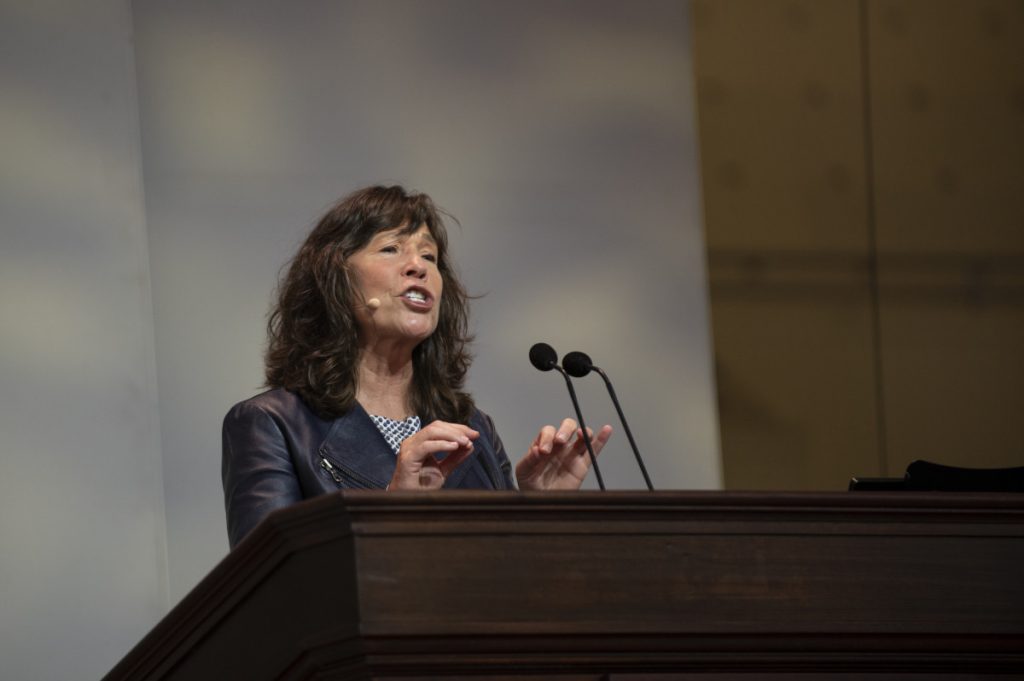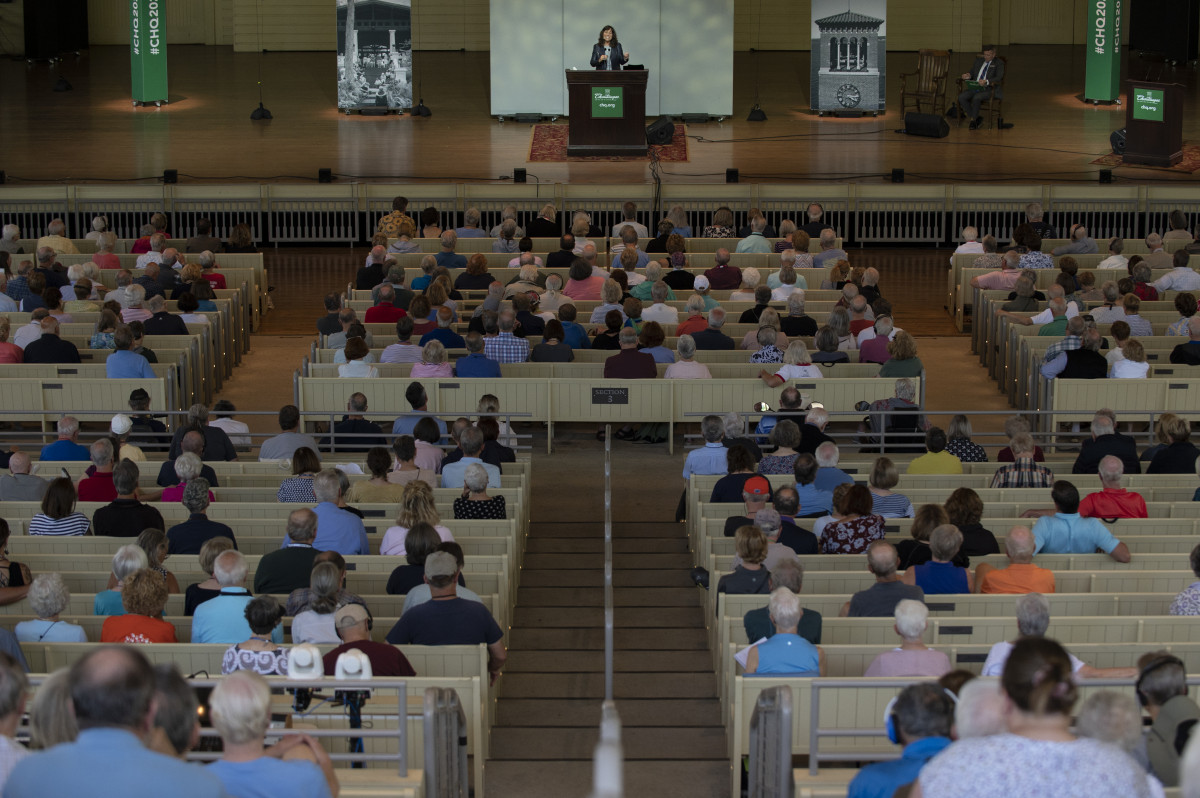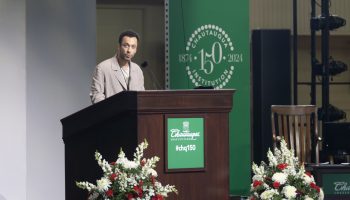Kori Schake, who leads foreign and defense policy studies at the American Enterprise Institute, reflected on how Chautauqua Institution started as a training school for Sunday school teachers — a profession she can relate to in some ways.
“I’m always shocked when I’m in government or political jobs and people think I’m either a ruthless killer or a shameless political hack, because I think it’s so obvious that I’m a school teacher. I’m Winslow Homer’s prairie school teacher standing at a chalkboard talking to farm kids about geometry,” Schake said. “So thank you, farm kids, for showing up to talk about the geometry of the international order.”
Schake’s lecture focused on three main aspects: the international order — including how the United States became so prominent — the contemporary challenges to the international order, and how President Joe Biden has handled these challenges. At 10:45 a.m. Thursday, June 30, in the Amphitheater, Schake hoped to answer these questions and more as part of the Chautauqua Lecture Series’ Week One theme of “What Should be America’s Role in the World?”
Schake defined the international order as the interaction of states as they attempt to preserve and advance their interests.
“Historically, the tools that states use for that are the strength of their economy, the use of military force, but also, increasingly over the last several hundred years, ideology,” said Schake, who has worked in various positions in the U.S. State Department and Department of Defense, including as a NATO military expert under Colin Powell.
The international order comes with at least 300 years of history. Schake believes that its history can start anywhere, with The Enlightenment or the Revolutionary War. In the last 150 years, Schake said, the United States has been an incredibly disruptive force to the international order.
“Martin Luther King and President Obama were fond of saying that the arc of history bends towards justice. That’s actually not true,” Schake said. “It only bends towards justice when people of good faith grab a hold of it and wrench it in that direction.”
This true disruption can be seen in the War of 1812 and the Monroe Doctrine, she said, as well as in the relationship between Britain and the United States as, respectively, superpower and rising rival superpower.
“(The United States) are actually going to be a force for democratizing the international order,” Schake said.
American power has become increasingly influential in the international order and is associated with the overall political culture of the United States, Schake said. One example of this is Britain’s policy decisions during the American Civil War, which include not recognizing the seceded states as a new nation.
“Who we are as a political culture constrained the government of the strongest power of the international order to make moves it manifestly believed were in its own best interest,” Schake said. “Ideology begins to creep in important ways, both in advance of American power and in the resistance to it.”
Schake focused on the 1890s, when a political challenge occurred. A democratized Britain found more similarities with the ,United States than other countries, which allowed for a transfer of power from Britain to America.
“Great Britain decided that it can allow the United States to become dominant because our power will add to their power,” Schake said.
British and American relationships changed through industrialization and westward expansion. The United States was no longer looking only inward, but rather outward, on expansion and globalization through the international order, Schake said.

Following World War II, when the United States “emerges as the only great power that isn’t destroyed by the war and can dictate the terms of the international order,” Schake said, the country constructs “an international order of agreed rules, of consensual rulemaking and enforcement.”
Schake reflected on globalization through this international order.
“The order that has made the United States and everybody else safer and more prosperous than they have been is the international order. … It is popular these days to decry the perils of globalization but,” Schake said. “… In 1980, 42% of the people in the world lived in conditions of extreme poverty. Today less than 9% of the world live in conditions of extreme poverty.”
When it comes to the international order, not everyone wants it to succeed, regardless that the systems and rules from the international order give time to organize in a crisis, Schake said.
“The most important rule of the international order the United States and its allies created out of the ashes of World War II was that you can’t violate the sovereignty of another state,” Schake said. “What we are seeing now is Russia attempting to overturn that rule.”
Russia’s refusal of Ukraine’s sovereignty and terror campaign in its war, she said, is a threat to the international order.
“The president of Russia believes that Ukraine has no right to sovereignty; that Ukrainians have no right to decide for themselves what their culture is, what language they speak, where their borders lie,” Schake said. “… This is the policy that President Biden has gotten more right than anything else, which is to argue the principle of state sovereignty, that people have rights and they loan them in limited ways by consent to governments.”
Schake said the rapid declassification of intelligence and sharing it with the public, as well as Biden and other leaders’ weaponization of the international financial network, has shown commitment to the Ukrainian war effort.
“What President Biden was trying to do is important,” Schake said “Russia is a country that could physically destroy the United States, and he is trying to limit the upward risk of escalation, that is, to give Ukraine enough assistance to win, but to do it in a way that does not provoke Russia to attack the United States or its 29, now almost 31, NATO allies.”
Schake then reflected on what the leaders of Russia and China have learned about the United States from Biden’s leadership. The United States is willing to lead the free world, to make sacrifices and run risks on behalf of people fighting for their freedom, Schake said.
“What I fear Russia and China are learning, despite all the good decisions President Biden and his fellow leaders of the free world have made, are that the United States won’t risk war against another nuclear power,” Schake said. “That the United States will rush its military forces out of harm’s way.”
With this lesson, Schake worries that if China and Russia act fast enough, the free world won’t have time to organize. She said that the United States’ withdrawal from Afghanistan undercuts the reliability and credibility of how the United States acts in a crisis.
Schake closed her lecture with the idea of justice and civic liberty.
“It falls to all of us, all of the time, to mobilize ourselves as (a) civic society, to hold our government accountable, to sustain and uphold democracy in our own country, and to advance it where possible in the world,” Schake said. “The absolute best way to protect and advance democracy in the world is to protect and advance democracy in the United States.”





